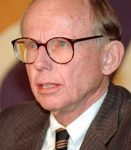 Name: Samuel P. Huntington
Name: Samuel P. Huntington
Lived: 1927-2008
Nationality: American
Profession(s): Political scientist, academic, author
Books: The Soldier and the State: The Theory and Politics of Civil-Military Relations (1957), Political Order in Changing Societies (1968), The Crisis of Democracy: On the Governability of Democracies (1976), The Clash of Civilizations and the Remaking of World Order (1996).
Perspective: Liberal-conservative
Huntington was born in New York City, the child of a writer and a publisher. A brilliant student, he graduated from high school in his mid-teens. Huntington completed degrees at Yale and the University of Chicago, before graduating with a doctorate from Harvard. He returned to Harvard as a lecturer, remaining there for most of his career.
During the late 1960s and 1970s Huntington worked as a strategist and advisor for the United States government. He provided strategic advice on the Vietnam War, suggesting a campaign of defoliation and carpet-bombing that would force Vietnamese peasants into communities, thus undermining the influence of the Viet Cong.
In his first book, The Soldier and the State, Huntington explored the relationship between civilian government and the military in the United States. He suggested that civilian control of the military was dependent on a professional officer class. In Political Order in Changing Societies, Huntington challenged the prevailing view that democratic government would inevitably take hold if preceded by economic development and modernisation.
Huntington’s most notable legacy was his ‘clash of civilisations’ theory, first articulated in 1993. In this theory, he argued that the post-Cold War world would be defined by tension and conflict between different civilisations, rather than between ideologies or nation-states. The most likely conflicts, according to Huntington, would be between Western nations like the US, Islamic civilisations in Asia and the Middle East, or a rapidly strengthening China.
Quotations
“American and Soviet patterns of civil-military relations have been similar in many respects. In both countries, the dominance of a single anti-military ideology has put obstacles in the way of military professionalism. In both countries also, the professional officer corps, when it did emerge, became a force for caution, sanity and realism. The stronger the military voice, the less the likelihood of conflict.”
“During the Cold War, the world was divided into the First, Second and Third Worlds. Those divisions are no longer relevant. It is far more meaningful now to group countries not in terms of their political or economic systems, or in terms of their level of economic development, but rather in terms of their culture and civilisation.”
“Westerners tend to think of nation-states as the principal actors in global affairs. They have been that, however, for only a few centuries. The broader reaches of human history have been the history of civilisations.”
“Differences among civilisations are not only real; they are basic. Civilisations are differentiated from each other by history, language, culture, tradition and, most importantly, religion. The people of different civilisations have different views on the relations between God and man, the individual and the group, the citizen and the state, parents and children, husband and wife, as well as differing views of the relative importance of rights and responsibilities, liberty and authority, equality and hierarchy. These differences are the product of centuries. They will not soon disappear. They are far more fundamental than differences among political ideologies and political regimes.”
“The end of ideologically-defined states in Eastern Europe and the former Soviet Union permits traditional ethnic identities and animosities to come to the fore. Differences in culture and religion create differences over policy issues, ranging from human rights to immigration, to trade and commerce to the environment… Most important, the efforts of the West to promote its values of democracy and liberalism as universal values, to maintain its military predominance, and to advance its economic interests engender countering responses from other civilisations. Decreasingly able to mobilize support and form coalitions on the basis of ideology, governments and groups will increasingly attempt to mobilise support by appealing to common religion and civilisation identity.”
“The fault lines between civilisations are replacing the political and ideological boundaries of the Cold War as the flash points for crisis and bloodshed. The Cold War began when the Iron Curtain divided Europe, politically and ideologically. The Cold War ended with the end of the Iron Curtain. As the ideological division of Europe has disappeared, the cultural division of Europe between Western Christianity, on the one hand, and Orthodox Christianity and Islam on the other, has reemerged.”
“The central axis of world politics in the future is likely to be… the conflict between ‘the West and the Rest’, and the responses of non-Western civilizations to Western power and values.”
With the exception of quotations, content on this page is © Alpha History 2018. This content may not be republished or distributed without permission. For more information please refer to our Terms of Use. This page was written by Jennifer Llewellyn and Steve Thompson. To reference this page, use the following citation:
J. Llewellyn & S. Thompson, “Historian: Samuel P. Huntington”, Alpha History, accessed [today’s date], https://alphahistory.com/coldwar/historian-samuel-p-huntington/.
